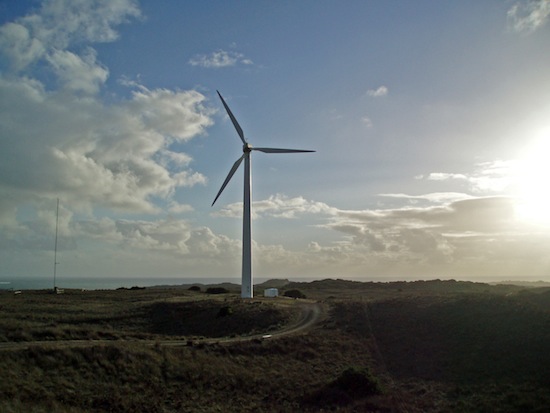As the Abbott government plays havoc with Tasmania’s bottom line, the state’s leadership remains mute [4 November 2014 | Peter Boyer]
Two events last week, one in Hobart, the other in Canberra, were depressing reminders of the yawning vacuum that in both places passes for climate policy.
In Hobart, Hydro Tasmania CEO Steve Davy announced the scrapping of a $2 billion project to build a giant wind farm on breezy King Island and send its power via cable into the national electricity market. It was the right decision, said energy minister Matthew Groom.
According to Davy, the “changing external factors” that made the project uneconomical included greater construction costs, a higher price for turbines and other imported equipment because of a lower Australian dollar, and a reduced general demand for grid electricity.
He also said that an undersea electric cable between Tasmania and Victoria via King Island was more expensive than a direct link such as the existing Basslink cable, and cited “a loss of industrial load” near where King Island power was to go ashore, south of Geelong.
All this may be true. The project may well have fallen over for these reasons alone. But doubts raised at the weekend about a proposal for a wind farm at Granville Harbour on the West Coast pointed the finger squarely at current uncertainty over renewable energy policy.
Economic viability is a complex beast with many moods and idiosyncrasies. A political shift can turn a viable proposition into a dead duck. Or breathe life into an apparently lifeless corpse.
The predominant view in government circles in Canberra is that climate change and renewable energy are low in the policy pecking order, well below things like coal, terrorism, people in boats and the cricket score.
That much was clear when federal environment minister Greg Hunt went on the airwaves to plug his government’s success in winning Senate support to get its climate plan through parliament.
Hunt’s interviews were long on blandishments and short on information. He kept harking back to Labor’s long-dead carbon tax, and when forced to discuss his own program revealed only that it would focus on tree-planting, improved farm soil management and greater energy efficiency.
He gave no hint as to how the farm and forest measures will cut emissions in the next few critical years, nor about what his government is doing for hydro and wind power, which isn’t surprising in light of Tony Abbott’s plan to cut the legislated renewable energy target.
The government shares with Labor a 2020 goal to have emissions 5 per cent below where they were in 2000, a minimal aspiration made easier by today’s falling electricity demand.
Direct Action is unsupported by economic modelling, as finance minister Mathias Cormann was forced to admit in the Senate last week, but independent models have found that the $2.5 billion allocated would achieve at most about half the abatement that’s needed. More likely, they say, it will be only a small fraction of that.
The government will be paying for industry abatement out of an Emissions Reduction Fund, but Abbott has decreed that if the fund runs out there will be no more money. That eliminates any chance of us setting a more ambitious target in response to mounting international calls for more stringent action.
Yet despite the obvious shortcomings of the government’s scheme, it’s better to have it out in the public domain strutting its stuff than continuing to gather dust in a dark corner.
The handful of other legal instruments for controlling emissions – the few that are left after the scrapping of Clean Energy Future laws in July – are all the work of others. It’s past time the government stopped attacking them and showed us how its own measures stack up.
Clive Palmer’s support for the legislation came with the condition that the Climate Change Authority will spend the next 18 months reviewing emissions trading schemes around the world.
It’s all but inevitable that the authority will find carbon cap-and-trade to be the best emissions-cutting tool. The government, for whom a carbon price is taboo, will try to ignore this and take the first opportunity to rub out the authority along with other remnants of Labor’s climate program.
“Taboo” is the word. Because he believes carbon emissions don’t affect the climate, Abbott discourages discussion of climate policy, and this colours conservative politics around the country.
Matthew Groom and premier Will Hodgman both say they believe that humans are changing the climate. That being so, they must be painfully aware that federal policies are undermining Tasmanian renewable energy initiatives.
They know that the Abbott government’s proposed cut to the renewable energy target will only add to the huge financial loss suffered by Hydro Tasmania when the carbon price was abolished in July.
Why won’t they say so? Tasmania is their responsibility. Why aren’t they out there calling Abbott’s anti-renewable, pro-coal stance for what it is, a threat to our economic future?
We are treading dangerous paths. This is when real leaders speak up.

